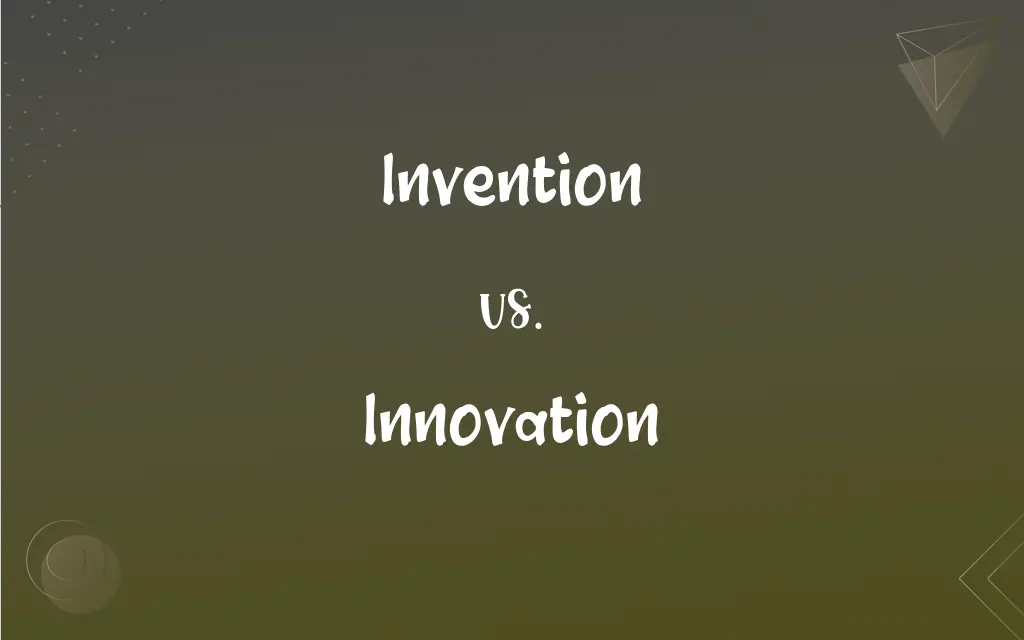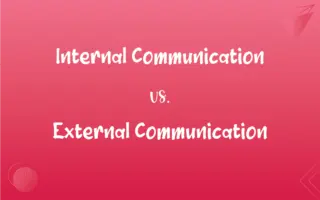Invention vs. Innovation: What's the Difference?
Edited by Aimie Carlson || By Harlon Moss || Updated on October 17, 2023
Invention is the creation of a new product or process, while innovation is the improvement or novel application of an existing one.

Key Differences
Invention refers to the conception and creation of something new that didn't exist before. Innovation, on the other hand, often starts with an invention but emphasizes the application and implementation of that invention in a new or improved manner.
Invention is often the first step, a eureka moment when an individual or a team devises a novel solution or concept. Innovation dives deeper, focusing on how that invention can be better integrated, improved upon, or utilized in different contexts, ensuring it brings value to users or the market.
Invention can be seen as a spark, the initial idea or prototype. It's the foundational stage, where the groundwork for something new is laid. Innovation, however, is the fuel that takes that spark and turns it into a roaring flame, adapting the invention to fit various needs, scaling it, or making it more efficient.
In the context of businesses, an invention might be patentable, safeguarding the intellectual property behind a new product or method. Innovation, however, revolves around strategy, marketing, and distribution, ensuring that the invention reaches its potential audience and fulfills its intended purpose.
Comparison Chart
Nature
Creation of a new product or process.
Improvement or novel application of an existing product/process.
ADVERTISEMENT
Focus
Original idea or prototype.
Implementation and scaling.
Protection
Often patentable.
Revolves around strategy and market adaptation.
Value
Lays the groundwork for something new.
Ensures utility and market relevance.
Timeframe
Initial phase, when the idea is conceived.
Can be continuous, adapting to changing needs and technologies.
Invention and Innovation Definitions
Invention
A novel creation not previously known.
The light bulb was a groundbreaking invention by Thomas Edison.
ADVERTISEMENT
Innovation
The act of improving upon or making significant changes to existing processes or products.
The innovation of electric cars is reshaping the auto industry.
Invention
A product or process originated after study and experimentation.
The invention of the internet transformed global communication.
Innovation
An advanced method or idea that brings added value.
The innovation of online banking made financial management more convenient.
Invention
An innovative solution to a specific problem in a field.
The invention of insulin was vital for diabetes treatment.
Innovation
The implementation of creative solutions to meet new requirements.
E-commerce platforms show constant innovation to enhance user experience.
Invention
A new concept or device birthed from creative thought.
The invention of the printing press democratized knowledge.
Innovation
A shift in thinking or approach to solve problems more effectively.
The innovation of telemedicine has been pivotal during global health crises.
Invention
The act of devising a new process or object.
Benjamin Franklin's invention of bifocals revolutionized eyewear.
Innovation
The introduction of something new or different.
Steve Jobs' introduction of the iPhone was a significant innovation in mobile technology.
Invention
The act or process of inventing
Used a technique of her own invention.
Innovation
The act of introducing something new.
Invention
A new device, method, or process developed from study and experimentation
The phonograph, an invention attributed to Thomas Edison.
Innovation
Something newly introduced.
FAQs
Can an invention exist without innovation?
Yes, an invention can exist as a standalone creation without being innovatively implemented or improved upon.
What is an invention?
An invention is the creation of a new product or process.
How does innovation differ from invention?
Innovation emphasizes the improvement or novel application of an existing product or process, while invention is about creating something new.
Is every innovation based on an invention?
Not necessarily. Innovations can be improvements or novel applications of existing ideas without a foundational invention.
Are innovations protectable like inventions?
While the underlying invention might be patented, the strategy or application of innovation is typically harder to protect.
Can a failed invention lead to a successful innovation?
Yes, an overlooked invention can be innovatively repurposed or improved to achieve success.
Are invention and innovation limited to technology?
No, they span all fields, from arts to sciences, and beyond.
Can innovation be a mindset?
Absolutely, innovation can represent a proactive approach to problem-solving and adaptation.
Are all inventions successful?
No, not all inventions find immediate success or acceptance.
Does innovation guarantee success?
While innovation increases the potential for success, it doesn't guarantee it.
Can innovation occur without a prior invention?
Yes, improvements or novel applications can be innovations on existing concepts without a new invention.
How does innovation add value to an invention?
Innovation ensures an invention's utility, relevance, and adaptability in the market or society.
How can one transition from invention to innovation?
By focusing on the application, improvement, and market relevance of the invention.
Who drives innovation in a company?
While leadership can set an innovative tone, all levels of a company can contribute to and drive innovation.
Can an invention be protected legally?
Yes, inventions can often be patented to protect intellectual property.
Why is invention important?
Invention lays the groundwork for progress, offering new solutions and possibilities.
How do businesses benefit from innovation?
Innovation can increase efficiency, market reach, and adaptability, driving growth and profitability.
Who is typically credited with an invention?
The person or team who conceptualizes and creates the novel product or process.
Is invention always a tangible product?
No, inventions can also be intangible, like methods or processes.
How do invention and innovation impact society?
They drive progress, improve quality of life, and often reshape societal norms and behaviors.
About Author
Written by
Harlon MossHarlon is a seasoned quality moderator and accomplished content writer for Difference Wiki. An alumnus of the prestigious University of California, he earned his degree in Computer Science. Leveraging his academic background, Harlon brings a meticulous and informed perspective to his work, ensuring content accuracy and excellence.
Edited by
Aimie CarlsonAimie Carlson, holding a master's degree in English literature, is a fervent English language enthusiast. She lends her writing talents to Difference Wiki, a prominent website that specializes in comparisons, offering readers insightful analyses that both captivate and inform.































































